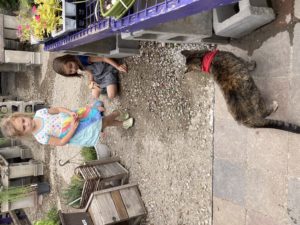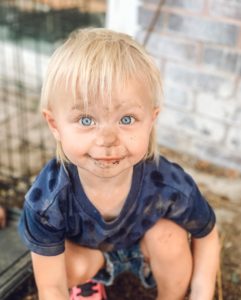Growing up on both a farm and a ranch (yes, they’re very different) gave me an appreciation for life I hope everyone is able to find. My imagination was constantly showing itself. From barn forts, to mud pies, I was always covered head to toe in dirt and smiles. Most kids ran through sprinklers, my friends and I ran through pivots.. really, really big sprinklers. . One of my earliest memories is my cousins and I swimming in the irrigation ditches and rinsing off in the cattle tanks.
..writting this blog is triggering so many memories 😊
The imagination that I developed is attributed greatly to being an only child for the majority of my childhood but much of that credit also needs to be given to my lack of fear of getting dirty.
All of these experiences created a rhythm for my life that I will forever be grateful for. I am stubbornly self sufficient..I need to ask for help more.. I’m a hard worker and not at all afraid to get dirty in the process, and I am aware of the importance of being in touch with nature…grounded..
Teaching your children the importance of good hygiene is important of course, but just as important as letting experience the world of dirt. Chasing children around with baby wipes and hand sanitizer is only bringing stress to the parent and preventing their immune systems from learning to fight off intruders.
Here are a few reasons to consider letting your kiddos play in the dirt!
They’ll likely be more active
When kids are allowed to play in the dirt, they may sit and make mud cakes for a while, but they’ll likely also be running, jumping, crawling and cartwheeling through it. All of this exercise is highly important, and the cornerstone of a child’s development.
As a bonus, when kids are enjoying being physically active on their own terms, it also teaches them that exercise is fun: an important lesson that will benefit their entire lives.
Immune system boost
Playing in the dirt — and even eating a bit of it — can help train and strengthen young immune systems. As microbiology and immunology educator Mary Ruebush explains:
“What a child is doing when he puts things in his mouth is allowing his immune response to explore his environment. Not only does this allow for ‘practice’ of immune responses, which will be necessary for protection, but it also plays a critical role in teaching the immature immune response what is best ignored.”
So, exposing your child to dirt early on may actually help their immune systems to battle invading organisms as they grow.
It may lessen the chance of developing allergies
Along with helping to strengthen the immune system, playing in the dirt may lessen a child’s chance of developing allergies. This is because gradual exposure to allergens in your area can allow the body to become accustomed to them.
As we reported previously, it has been found that children raised on farms suffer from less instances of allergies and autoimmune conditions than children not raised on farms. A big part of this is dirt exposure.
Grounding is important
Grounding, also known as “earthing,” is simply having  our feet and bodies in contact with the earth. As we explored in a previous article, doing this on a regular basis may lead to a reduced risk of many chronic conditions.
our feet and bodies in contact with the earth. As we explored in a previous article, doing this on a regular basis may lead to a reduced risk of many chronic conditions.
To let your kids get some good grounding into their days, let them run through the dirt barefoot when the weather permits. It doesn’t take long to wash off their little feet!
They need the vitamin D
Playing in the dirt often means more time in the sun — and kids need that vitamin D to protect the health of their bones and immune systems. Sun safety measures are important, but not enough time in the sun isn’t healthy and could lead to negative effects.
A close relationship with nature
When children play in the dirt, they learn a lot about nature. They learn about the plants that grow in the soil, and about the creatures that live in it. For young children, the textures of soil, mud, sand and grass are extremely stimulating, and they learn a great deal about their environment from engaging with it.
A love of nature that is nurtured early on can lead to a lifelong love of nature — a noble passion, indeed.
It may boost their brains
A body of research has found a link between time spent in the outdoor environment and increases in kids’ cognitive skills. For one example, a 2004 study published in the journal Environmental Education Research found that an environmental education course positively affected the critical thinking skills of high school students.
It helps relieve stress
When children are allowed free, unstructured playtime in the great outdoors, it may greatly help to relieve stress and anxiety, according to the National Wildlife Federation. Since stressors abound for kids between schoolwork, social issues and all of the other struggles that accompany growing up, some stress-relieving playtime is crucial.
They’ll be happier!
Not only has playing in the dirt been found to boost children’s moods, one look at the smiling face of your child as they run barefoot through the sand tells you this exact thing: Playing in the dirt is fun!
We could learn a lot from our kids and do it more often ourselves. Some quality family time jumping in mud puddles, gardening, playing soccer or playing tag in the soil or grass could be extremely beneficial to everyone involved. It’s worth the dirt and mess!









